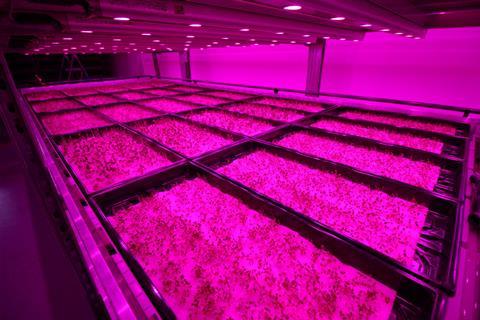
Bringing food production closer to consumers and filling disused urban spaces are some of the reasons why Jamie Burrows and his wife Marie-Alexandrine decided to set up Vertical Future, a new start-up based around urban farming, health and technology.
The company has three primary aims to help deal with what it calls the “resurgence in cities”: addressing food security through urban farming, digital health and the development of a new app, and tackling air pollution with a device that is currently in development.
MiniCrops, the urban farming part of the company, is located in a former 120,000 sq ft warehouse site in Deptford, south London, where over a tonne of micro greens and herbs are produced every month using LED lighting and a hydroponic system.
Currently the business supplies restaurants across central London, as well as selling direct to customers via online subscriptions to its micro produce boxes. Deliveries are made by the company’s one electric vehicle, while the five-person operations and marketing team in Deptford are primarily locals, with technical support provided by LED lighting specialists Phillips.
“The future of food is about maximising space and operating close to the consumer,” says Burrows, a former economist with an interest in health improvement. “We are based in a converted warehouse because the whole model is about transforming disused spaces and bring new economic life to the area and giving jobs to people who need them.”
Burrows says this wider social agenda is what sets MiniCrops aside from its closest competitors in London urban farming – Growing Underground and GrowUp, both of which he says have a greater focus on retail listings. MiniCrops will continue to target the B2C market, as well as chefs, Burrows says, and maintain its strong focus on the health and nutrition messaging around micro produce.
Far from being just another London-centric food trend, urban farming is part of a much wider global movement that is beginning to attract some serious investment, especially in the US, from the likes of Google’s parent company Alphabet and other major players in Silicon Valley.
While GrowUp’s relatively impressive £1.1 million funding from Innovate UK, and Growing Underground’s £200,000 in crowdfunding, are significant cash injections, they are dwarfed by a recent $200m funding boost to US urban farm Plenty, which included hedge funds investing on behalf of Google and Amazon and is described as the largest agri-tech investment in history.
Speaking at the FT Future of Agriculture Summit recently, Ben Belldegrun, co-founder at investment fund Pontifax AgTech, highlighted urban farming as an area of interest for agri-focused investors, as a sector that is particularly sustainable, with lower inputs and food miles, and therefore likely to produce long-term returns.
For Burrows, the major financial interest in the US is a sign that the sector is on the brink of a major scaling up, with acquisition possibilities likely for those who are already established in the UK.
“Personally I think in the next three to five years we will see major players coming over here to compete. We need to solidify our position very quickly,” he says. “In addition, there is a huge resurgence in cities and there needs to be a major shift in how we produce and distribute our food.”
Burrows believes long-term interest in urban farming will grow due to rethinking of city spaces as car ownership declines, as well as political issues such as Brexit placing more pressure on food prices.
Meanwhile, to have a significant impact on city food supply, something that will become more critical as climate change continues to impact traditional production, urban farming will have to diversify. Growing leafy salads rather than micro greens would be an obvious and initial development, but it is more expensive and requires more sophisticated systems, says Burrows, noting that companies in the US are already developing this with the help of robotics.
As the world gears up for the anticipated huge population growth, producing food inside cities, where most of this growth is likely to occur, and in a low-input and sustainable way, is likely to become one of the most valuable supply networks of the future. Pioneers such as Vertical Future are already leading the way.



